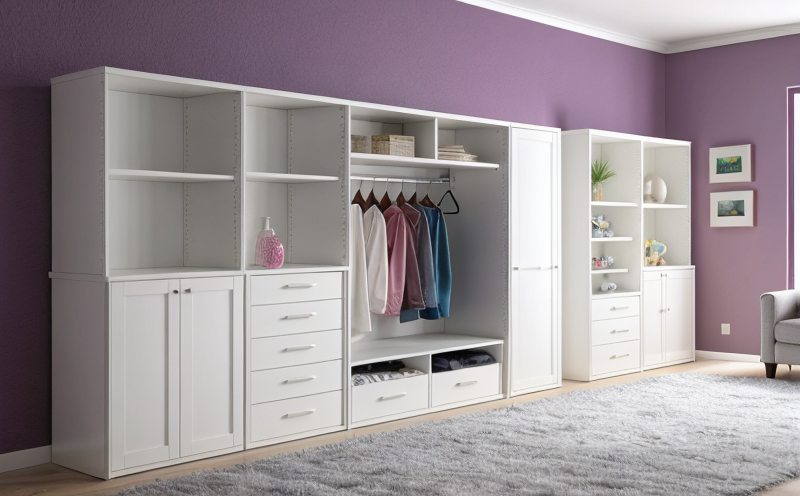BS EN 12720 Resistance to Cold Liquids of Storage Unit Surfaces Testing
The British Standard and European Norm (BS EN) 12720 specifies the method for testing the resistance of storage unit surfaces to cold liquids. This test is essential in ensuring that storage furniture, particularly those made from materials like wood or metal, can withstand exposure to cold liquids without sustaining damage. The standard applies to various types of storage units such as cabinets, shelving units, and other similar structures used in residential or commercial settings.
The testing procedure involves placing a defined amount of a specified cold liquid (such as water) on the surface of the storage unit for an extended period. After this exposure period, the integrity of the surface is evaluated to determine if any damage has occurred due to the contact with the cold liquid. This test is crucial for manufacturers aiming to comply with international standards and ensure their products meet safety and durability requirements.
The BS EN 12720 resistance test focuses on the mechanical properties of storage furniture surfaces, which can be compromised by exposure to cold liquids. Cold liquids are often encountered in environments where storage units are used frequently, such as offices, schools, or healthcare facilities. Ensuring that these units remain intact and functional is critical for maintaining hygienic conditions and operational efficiency.
During the test, it’s important to follow the prescribed methods meticulously, including the type of cold liquid used (e.g., water at a specific temperature), the duration of exposure, and the manner in which the liquid is applied. The apparatus required for this testing includes calibrated containers for holding the cold liquids and precise measurement tools.
The acceptance criteria for passing the test are clearly defined within the standard. A storage unit passes if its surface remains undamaged after the prescribed exposure period to cold liquids. Any visible cracks, peeling, or other signs of damage would result in a failure, indicating that further quality control measures may be necessary.
For those involved in furniture manufacturing and design, understanding this test is vital for developing products that meet international standards. Quality managers, compliance officers, R&D engineers, and procurement teams can benefit from knowing the specifics of this testing to ensure their products are robust and reliable.
Benefits
- Enhances product durability by ensuring resistance to cold liquids.
- Aids in meeting international standards, thereby expanding market reach.
- Supports quality control processes through rigorous testing methods.
- Promotes hygienic conditions and operational efficiency in various settings.
The BS EN 12720 test provides peace of mind for manufacturers by ensuring that their storage units can withstand exposure to cold liquids without compromising on integrity. This not only enhances the longevity of the products but also ensures they meet stringent international standards, thus opening up new market opportunities.
Customer Impact and Satisfaction
- Customers receive durable storage units that can withstand harsh environmental conditions.
- Hygiene levels are maintained in various settings where these products are used regularly.
- The reliability of the products ensures customer satisfaction, leading to repeat business and positive reviews.
By conducting this test, customers benefit from products that not only meet but exceed international standards. This commitment to quality and durability fosters long-term relationships with clients who appreciate the value and longevity provided by these storage units. The confidence in product reliability directly translates into higher customer satisfaction levels.
International Acceptance and Recognition
The BS EN 12720 standard is widely recognized across Europe and beyond for its stringent testing requirements. Compliance with this standard ensures that storage units meet the highest quality benchmarks, making them suitable for use in various environments worldwide.
Many industries rely on furniture that can withstand cold liquids to maintain operational efficiency and hygiene standards. The acceptance of BS EN 12720 by international bodies further solidifies its importance as a global standard. Manufacturers who adhere to this standard are better positioned to compete in the global market, ensuring their products meet the expectations of discerning customers.
The widespread recognition of this standard also encourages continuous improvement in manufacturing processes and materials used in storage furniture production. This ongoing effort contributes to the development of more resilient and hygienic storage solutions that can stand up to challenging conditions.





